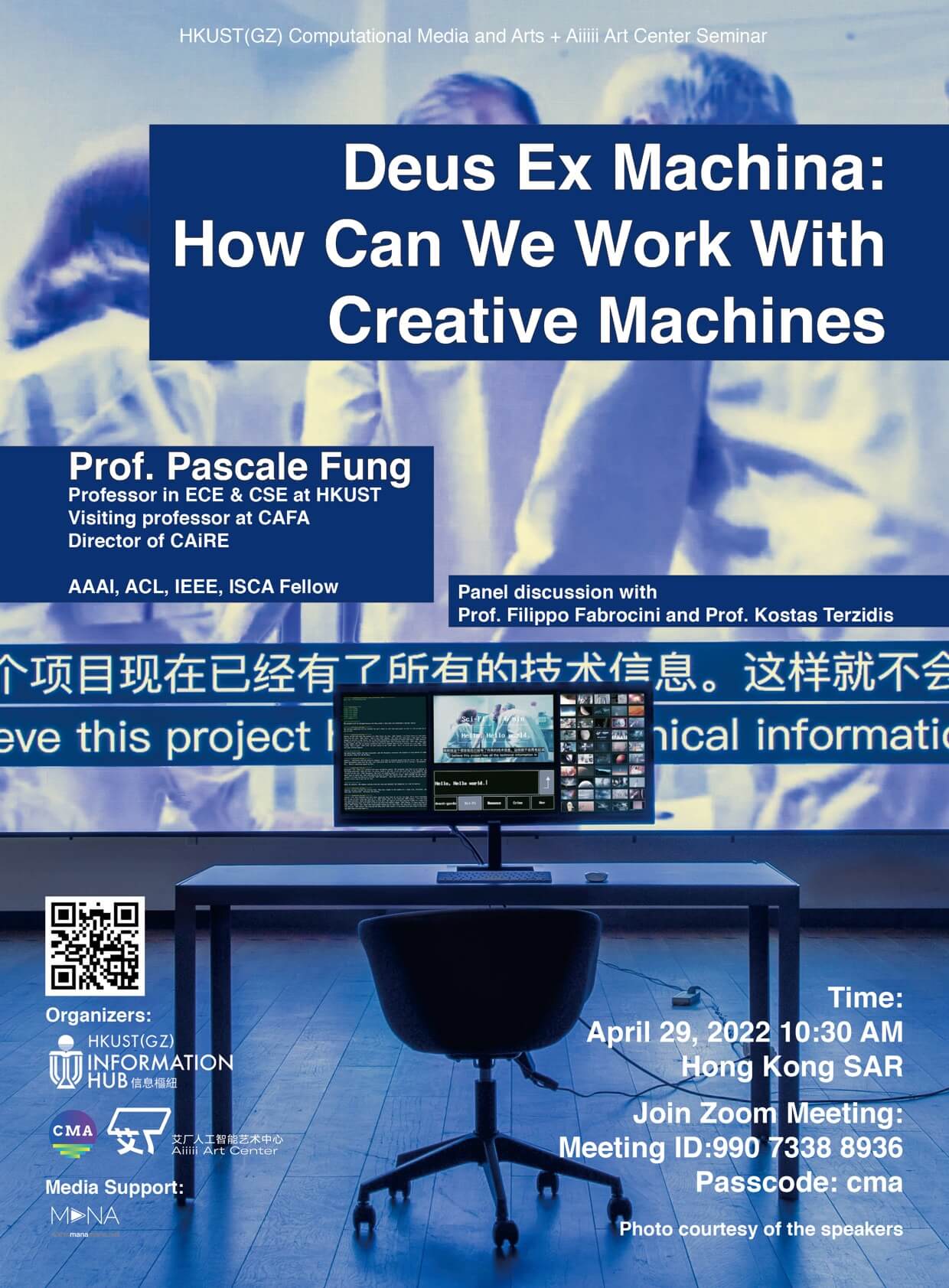
Deus Ex Machina:
How Can We Work With Creative Machines?
Intro
Abstract:
AI is widely used today for tasks like speech recognition, computer vision, machine translation, dialog systems or chatbots. But can AI be applied to art? There have been several attempts to use deep learning in computer vision to produce pictures and paintings. Some were even sold at auction houses. Beyond using AI as tools for artists, can AI and machine learning generate new forms of art? In this talk, Prof. Pascale Fung will challenge the notion of creativity as a human trait by presenting some of the groundbreaking research on AI and art that was created in collaboration with Central Academy of Fine Arts in Beijing. She will show that, beyond multimedia and digital, we have entered a new era of “AI art” - art that is partially created by the machine and partially by human artists.
Seminar Date:
10:30am - 12:00 am, April 29, 2022
Time Schedule:
45 mins talk + 30 mins Panel discussion + 15 mins Q&A
Organizers:
Computational Media and Arts (CMA), Hong Kong University of Science and Technology(GZ)
Aiiiii Art Center
Media Support:
MANA
Language:English
Speakers:
Host: Jake Zhang
Spearker: Prof. Pascale Fung
Panel Discussion Speakers: Prof. Filippo Fabrocini, Prof. Kostas Terzidis
Title: Deus Ex Machina: How Can We Work With Creative Machines?
Speakers Info:
Prof. Pascale Fung is a Professor in the Department of Electronic & Computer Engineering and Department of Computer Science & Engineering at The Hong Kong University of Science & Technology (HKUST), and a visiting professor at the Central Academy of Fine Arts in Beijing.
She is an elected Fellow of Association for Advancement of Artificial Intelligence(AAAI), an Fellow of the Association for Computational Linguistics (ACL) , an Fellow of the Institute of Electrical and Electronic Engineers (IEEE) and an Fellow of the International Speech Communication Association(ISCA). She is the Director of HKUST Centre for AI Research (CAiRE), an interdisciplinary research centre on top of all four schools at HKUST. She was the founding chair of the Women Faculty Association at HKUST. She is an expert on the Global Future Council, a think tank for the World Economic Forum. She represents HKUST on Partnership on AI to Benefit People and Society. She is on the Board of Governors of the IEEE Signal Processing Society. She is a member of the IEEE Working Group to develop an IEEE standard - Recommended Practice for Organizational Governance of Artificial Intelligence. She is the Chief AI Scientist for AI-IF, world’s first all AI-generated film in collaboration with the artist Xu Bing. She is an Expert Adviser for the Arts Capacity Development Funding Scheme (ACDFS) under the Advisory Committee on Arts Development (ACAD), HKSAR government 2021.
More information: https://pascale.home.ece.ust.hk/index.html
Panel discussion with Prof. Filippo Fabrocini and Kostas Terzidis
Prof. Filippo Fabrocini is professor in the College of Design & Innovation and Director of the “Sustainable AI Lab”. His main areas of interest are Machine Learning and Ethical AI. Previously he has been Senior Researcher at IBM Research (Rome, Italy/San Jose, USA), Visiting Researcher in the School of Computer Science at Carnegie Mellon University (Pittsburgh, USA), Professor in the Dep. of Philosophy at Gregorian University, and General Manager of the IBM Milan/Rome Business Innovation Center (IBM BIC). Prof. Fabrocini has won multiple awards including two IBM Outstanding Technology Awards. He is the author of more than 30 papers and three books
Prof. Kostas Terzidis is professor in College of Design and Innovation at Tongji University and director of the ShangXiang Lab. Previously, was associate professor at Harvard University GSD (2003-2011) and assistant professor at the UCLA (1995-2003). He holds a PhD from the University of Michigan, Masters from OSU, and diploma from Aristotle University. His research is automated design and AI. He is author of numerous academic papers and the sole author of four books: Permutation Design (Routledge: 2014), Algorithms for Visual Design (Wiley: 2009), Algorithmic Architecture (Architectural Press: 2006), and Expressive Form (Spon:2003). Between 2011-2017 he created and ran a startup called Organic Parking, Inc.
Image Credit: Xu Bing Studio